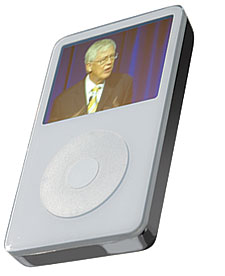Last year, Dominic Steele began a sermon at Annandale by telling the congregation that more people would be listening that night via internet podcast than in person. He then delivered a "cheerio' to listeners in cyberspace.
Later, an email arrived from a podcast subscriber in the UK. The subscriber had found himself being greeted by Dominic as he travelled to work the next morning.
Listening to his ipod as he travelled to work, the Londoner's device had automatically downloaded Dominic's sermon. The commuter had then politely returned the greeting to Dominic via cyberspace.
Podcasts (audio content downloaded online) are already connecting believers in Annandale, London and everywhere in between.
As part of the 2006 National Church Life Survey, Anglican Media commissioned research into the media habits of churchgoers. The results show that about 1 in 10 Sydney Anglicans already use podcasting services.
However more significant is the clear generation gap that has opened up, particularly in utilising the interactive capacity of the new media.
particularly in utilising the interactive capacity of the new media.
Amongst Sydney Anglicans aged between 15 and 30, more than 40 per cent use internet forums and chat services regularly.
In comparison, 8 per cent of generation X and 7 per cent of baby boomers do so.
Of those Sydney Anglicans surveyed, no one over 65 was using these services regularly.
It is important for churches to think through how new media is changing the way young people build community.
Indeed, the technology is moving so quickly that a new generation in online church could soon be upon us.
Three new "vodcasting' " or online video broadcasting - initiatives mean Sydney Anglicans are already at the forefront of the next generation of internet ministry.
Two new sites, reason4hope.com.au and buildinggodspeople.com, have been launched to provide free downloadable video sermons from well-known evangelical preachers.
In addition Ken Sandell, from Christian media technology providers Audio Advice, is constructing a "Cathedral TV' website which will podcast Phillip Jensen's weekly lunchtime Bible talks.
It is hoped city workers who cannot make the talks may be able to watch them streamed onto their desktop computers during a lunchbreak.
A deal has also been reached for the sermons from these three websites to fill a total of five slots a week on the Australian Christian Channel (ACC).
It is hoped that these broadcasts will eventually be included on ACC's affiliate channels around the world, including in Indonesia.
Mr Sandell is also behind Reason 4 Hope and believes vodcasts open up countless possibilities.
"Because the talks can be downloaded and burnt to DVD, they can be used for small groups in people's homes, for churches in the country who are short of a minister one week, or even to help train pastors in third world countries," he said.
It takes a few hours to download the talks for DVD-quality or just a few minutes to watch the talks streamed through your computer's media player.
"Often, seeing a speaker helps you to understand their message more clearly," Mr Sandell says.
Archbishop Peter Jensen was the first speaker featured on the ACC and reason4hope.com.au. Other speakers will include Richard Coekin, Phillip Jensen, Simon Manchester and Al Stewart. They were filmed by Ken at various Christian conventions over the past few years.
The long-term aim is to have an extensive library of evangelical sermons and conference addresses being viewed around the world, via TV and online.
Meanwhile, buildinggodspeople.com will feature sermons from Christians in the Media's Sunday meetings.
Mr Steele said the popularity of podcasted sermons, like those provided by sydneyanglicans.net and Christians in the Media, made it obvious that vodcasts are the way of the future.
"This is where the world is moving technologically, and as Christians we need to keep up with that," he said.
Mr Steele said the vodcasts had two potential audiences: internet-savvy Christians who are already well fed at church but seek more biblical input online; and Christians in remote or difficult areas who are starved of biblical input.
"Imagine a country town where there is no minister, for example. It will make an enormous difference for people to be able to receive Australian evangelical Bible teaching for free," he said.
Anglican Media Sydney, publisher of Southern Cross, signalled its commitment to new media by selling its Northbridge television studio for over $1.5 million last month.
They will move into new, smaller facilities at Parramatta, designed with new media developments in mind.
Anglican Media also has positioned itself at the forefront of using new media to proclaim the gospel by employing the Church's first ever E-vangelist, David Horne.
Its strategy reflects the research showing a significant proportion of under 30s using the internet's relational tools.
Many young people develop and build friendships online. As a result, David Horne's focus is on building Christian community online not merely using the internet to broadcast Christian content.




















